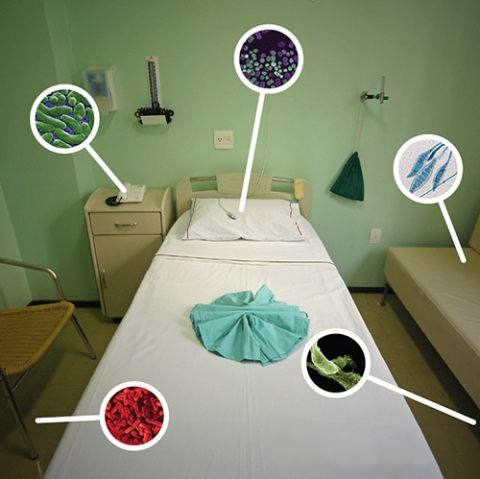
FLAGSTAFF, Ariz. — Sept. 2, 2016 — A new study by the Translational Genomics Research Institute (TGen) details the design and validation of a low-cost, rapid and highly accurate screening tool — known as KlebSeq — for potentially deadly healthcare-acquired infections (HAIs), such as Klebsiella pneumoniae. HAIs affect hundreds of thousands of patients annually and add nearly $10 billion in associated healthcare costs.
The findings, to be published in October issue of the Journal of Clinical Microbiology, detail the workings of the KlebSeq test at detecting HAIs earlier, in particular Klebsiella, which has multiple strains, such as ST258, that are increasingly resistant to treatment by antibiotics.
Unlike traditional assays that requires growing a live culture in a laboratory setting, which adds days to the testing process and layers on cost, KlebSeq employs a technique called amplicon sequencing that identifies the presence of Klebsiella and stratifies its characteristics, such as strain type and whether it may be antibiotic resistant.
“KlebSeq is able to accurately and consistently identify and characterize Klebsiella from many different types of specimen samples, including blood, urine, nasal swabs, and respiratory fluids,” said Dr. Jolene Bowers, a Post-Doctoral fellow in TGen’s Pathogen Genomics Division, TGen North, and the paper’s first author.
In 2015, Bowers co-led a study published in PLOS ONE, in collaboration with the U.S. Centers for Disease Control and Prevention, which documented the rapid global spread of ST258.
According to the CDC, nearly 2 million Americans annually contract bacterial infections that are resistant to at least one antibiotic, and 23,000 die each year from such infections, nearly twice as many who die of AIDS.
“Improved testing technology holds great potential for the rapid detection of HAIs and more quickly identifying antibiotic-resistant infections, such as K. pneumoniae, which have become an urgent public health crisis,” said Bowers. “KlebSeq is a perfect example of the power of genomic-based analytical tools that deliver results faster, more accurately and at a lower cost.”
According to Dr. David Engelthaler, Director of Programs and Operations for TGen North, and one of the authors of the study, transmission of multidrug-resistant strains of K. pneumoniae is rapid and without initial symptoms, leading to outbreaks in the healthcare system and the community that often go undetected.
“Early detection of K. pneumoniae in healthcare patients, especially those with multidrug-resistant strains, is critical to infection control,” said Dr. Engelthaler, who also is a former epidemiologist for the state of Arizona. “Perhaps most concerning is that Kleb acts like a shuttle for critical resistance genes, often transmitting them to other HAI species. It is important for us to detect both the bacteria and these critical genes.”
KlebSeq can be used for routine screening and surveillance, enabling healthcare staff to make more informed patient decisions, and curb outbreak situations by rapidly identifying transmissions prior patients showing signs of infection. Classifying the type of infection in each patient would help enable an institution to decide when and which intervention procedures to enact.
Study results suggest that KlebSeq would be especially helpful for high-risk patients — those in intensive-care units, centers specializing in bone marrow transplantation or chronically immunosuppressed patients, long-term care facilities, and travelers returning from endemic regions.
“The sensitivity of KlebSeq is superior to culture-based methods,” said Dr. Paul Keim, Director of TGen North and the senior author of the study.
“KlebSeq is an important step toward a comprehensive, yet accessible, tool for all pathogen identification and characterization,” said Dr. Keim, who also is the Cowden Endowed Chair of Microbiology at Northern Arizona University, and Director of NAU’s Center for Microbial Genetics and Genomics (MGGen).
The results also suggest that KlebSeq could be easily modified to detect other healthcare-acquired infectious agents, and identify those with antimicrobial resistance. It could also be used for outbreak detection, transmission mapping and tracing the source of infections by being able to screen hundreds of patient samples simultaneously, at a cost of tens of dollars per patient.
###
About TGen
Translational Genomics Research Institute (TGen) is a Phoenix, Arizona-based non-profit organization dedicated to conducting groundbreaking research with life changing results. TGen is focused on helping patients with neurological disorders, cancer, and diabetes, through cutting edge translational research (the process of rapidly moving research towards patient benefit). TGen physicians and scientists work to unravel the genetic components of both common and rare complex diseases in adults and children. Working with collaborators in the scientific and medical communities literally worldwide, TGen makes a substantial contribution to help our patients through efficiency and effectiveness of the translational process. For more information, visit: http://www.tgen.org. Follow TGen on Facebook, LinkedIn and Twitter @TGen.
Media Contact:
Steve Yozwiak
TGen Senior Science Writer
602-343-8704
[email protected]
Media Contact
Steve Yozwiak
[email protected]
602-343-8704
http://www.tgen.org
The post Study validates TGen-developed test for health care-acquired infections appeared first on Scienmag.





